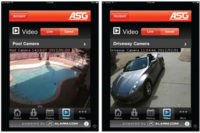Some customers have assets such as artwork or computers that deserve special protection. Rather than relying only on motion detectors and door/window contacts, these customers may opt to add additional sensors to help secure these valuable items.
Smart security dealers will keep their eye out for opportunities to secure such property. Including specialty sensors in an installation can raise upfront revenues as well as raising customer satisfaction and loyalty. SDM spoke with more than a dozen dealers in researching this story and most of them said they also charge extra for monitoring specialty sensors.
We asked the dealers, as well as a few specialty sensor manufacturers, about the kinds of assets that could require protection — including some you might not have considered.
1 - Air conditioning units are often targeted by thieves because they contain valuable copper components. Several manufacturers make sensors designed specifically for protecting air conditioning equipment — and Cleveland Aaron Jones, president of Memphis-based Digital Systems Integration, has real-world evidence of how well these sensors work. He typically programs panels to treat alarms from these sensors as silent alarms that report to the central station — and by using that approach one of his systems helped prevent the theft of air conditioning equipment from a local church. The would-be thieves ran off when police showed up.
2 - Artwork can be worth huge sums of money. One dealer that knows this very well is New York City-based DGA Security Systems. The company protects numerous New York art galleries and museums using proprietary shock-sensing equipment that detects movement of a painting or antiquity. Museums typically have their own security force, which is alerted in the event of an alarm. For galleries that lack their own security force, DGA will dispatch its own response agents.
3 - Blood banks are highly sensitive to temperature, explains Steven Kaufman, president of Monticello, N.Y.-based PN Fire and Burglar Alarm Company. Temperature sensors help ensure that temperatures are kept within the specified range. To help ensure system performance, Kaufman’s company inspects such systems annually.
4 - Boats. Not surprisingly, considering its location, Hollywood, Fla.-based dealer Devcon Security Services is sometimes called upon to protect boats. Roy Pollack, senior director of compliance for the company, says the company often uses “leaky coax” for this purpose. “It’s embedded in concrete around the boat, which is sitting on a pedestal” he explains. “It prevents someone from backing a trailer up.” The coax sets up a field and if someone breaks the waves, an alarm is generated, Pollack explains.
5 - Bonsai plants can live to be more than 200 years old, making some of them very valuable — including some on display at Michigan State University’s Hidden Lakes Gardens in Tipton, Mich. Those plants are protected with plunger switches installed underneath each pot, explains Steve Courtney, Hidden Lakes Gardens manager. If the pot is lifted, an alarm is generated. The organization installed the equipment, which initially was connected only to a local sounder. A recent donation enabled the organization to add central station monitoring. Central station operators notify Hidden Lakes security personnel and/or management, depending on the time of day.
6&7 - Cars and construction equipment share one thing in common. They’re often left outside, making them potentially vulnerable to theft. For really valuable equipment and vehicles, dealers may install alarm equipment with global positioning system (GPS) capability, enabling them to track the vehicle and hopefully catch the thief or at least recover the vehicle. GPS may be cost-prohibitive for some customers, however.
One alternative is to use driveway sensors designed to detect vehicles entering or leaving a property. Some of these systems work by detecting the metal of the vehicle. The devices may not be the most aesthetically pleasing for some customers. But to help overcome objections, Kingston, N.Y.-based Safeco Alarm Systems uses hollow artificial rocks designed to hide the device, which are available from some manufacturers, advises Miriam Gibbons, Safeco security consultant.
Another option is to attach RFID tags to the vehicle or equipment so that an alarm is generated if the vehicle or equipment is moved beyond a certain point. Or if a customer has a lot full of vehicles or equipment to protect, the dealer may want to use perimeter protection such as photoelectric beams.
8&9 - Computers and other valuable electronics can be secured by using what some manufacturers call asset protection sensors, which typically are wireless devices designed to detect if an object is moved. Norwalk, Conn.-based Security Solutions also likes to install moisture sensors to protect computer room floors. “Leaks are very dangerous,” observes Security Solutions President Jamie Orvis. “They can damage equipment and are a safety risk for people working there.”
10 - Gun rooms and cases. Louisville-based Assured Asset Protection installed a customized system for a customer who had a large gun room. In addition to alarming the door, the company installed a motion detector, smoke detection and a temperature sensor. Some of the customer’s guns were high-end, says Philip Kaufman, co-owner of the company. “Moisture and temperature can be critical,” he notes.
Some customers may keep guns in gun cases, which can be secured with contacts or asset protection sensors. Lee Thompson, general manager of Dover, Del.-based Advantech recommends programming panels so that alarms are tripped only when customers are away from home.
11 - Liquor cabinets. Installing contacts on liquor cabinets has become increasingly popular with the advent of alarm systems that can send a text or email to a homeowner’s cellphone. Many parents would like to know if their children open the liquor cabinet, but they may not want the central station involved. Advising potential customers of this option can help in selling email notification, which may generate extra monthly revenue, help make the system sale and keep the customer engaged moving forward.
12 - Medical specimens. North Haven, Conn.-based Nationwide Security did an installation at Yale University that included numerous temperature sensors to monitor freezers where medical specimens were kept. As Nationwide President Michael Viscuso explains, the company installed a system that uses probes connected to a hub device or receiver that also keeps an internal log or event buffer that stores temperature information. Nationwide also monitors power on the hub unit. “If it goes out, it goes to standby power and sends out an email,” Viscuso explains.
13,14,15 - Packages left at a homeowner’s front door are prime targets for thieves. But some homeowners are minimizing this risk by installing video cameras with external or internal motion detection that send an alert to the homeowner’s cellular device when a package is left or removed. Some installers also may include voice capability so that the homeowner can speak with the delivery person — or scare off a would-be thief. Some homeowners install do-it-yourself systems for this purpose, explains Jerold McGlothlin, chief executive officer of 257 Protection Security Super Store. But not everyone likes the DIY approach, making this an opportunity for dealers as well. The same approach can be used for other outdoor assets such as lawn furniture, grills and the like.
16 - Pets. Some homeowners like to make sure temperatures in their home don’t get too hot for their pets. Temperature sensors can be programmed to send an alert if the temperature in a customer’s home exceeds a certain level, notes Brian Seeman, president of Husdon, Wis.-based manufacturer Resolution Products.
17 - Pipelines. Protecting pipelines is a specialty for U.S. Seismic Systems of Chatsworth, Calif., which designed a fiber optic system specifically for that purpose that is available to security dealers through Torrance, Calif.-based PCSC. The system is installed alongside oil or gas pipelines and is designed to detect pipeline leaks. If there is a minute disturbance along the fiber, it changes the pathway taken by the laser light traveling through the fiber, and signal processing is used to determine whether the disturbance was caused by footsteps, a vehicle or someone digging, explains Howard Wilkinson, vice president of sales and marketing for U.S. Seismic Systems.
18 - Pipes. Making sure pipes don’t freeze in a customer’s second home or while the homeowner is on vacation is a job for temperature sensors. Some manufacturers offer combination water and temperature sensors, which some call “disaster” sensors.
19 - Safes and vaults. Vibration sensors are an excellent way to detect someone trying to break into a safe or vault. The sensors should be programmed as a 24-hour zone with a silent alarm, advises Chris Mosley, president of Marlboro, N.J.-based Complete Security Systems. Customers “don’t want to chase a burglar. They want to catch him,” Mosley comments.
20 - Solar panels. Solar panels are another common target for thieves, notes Tim Bleigh, North American sales director for Santa Clara, Calif.-based manufacturer Takex. Several companies make sensors designed specifically to protect solar panels. Some can even be powered by the panels — a useful capability when no other power is available at the site.
21 - Wildlife. Security dealers are accustomed to installing motion detectors designed not to alarm when they detect an animal rather than a human intruder. But Garnet McBride, president of Thomasville, Ont.-based Absolute Automation remembers one customer who wanted to detect wildlife. The customer knew that caribou regularly passed through his yard and wanted to see them but kept missing them. Absolute recommended setting up a fan-pattern motion detector at a height of about three feet so that it would not detect smaller animals and would chime when tripped. Other customers have used similar systems to trigger sirens to scare wildlife away from gardens or ponds.
These are just a few examples of numerous ways security dealers have secured property and met customers’ needs. Specialty sensors in an installation continue to present ways to increase revenue right alongside customer satisfaction and loyalty — a winning combination.
Who Offers Specialty Sensors?
Dakota Alert http://dakotaalert.com/ 605-356-2772
DeWalt Mobile Lock http://dewaltmobilelock.com/main.asp 410-975-5600
DynaQuip Controls Corp. http://www.watercop.com 800-545-3636
GRI (George Risk Industries) http://www.grisk.com/ 800-523-1227
Honeywell http://www.security.honeywell.com/ 800-467-5875
Interlogix http://www.interlogix.com 855-286-8889
Magnasphere http://www.magnasphere.com/ 262-347-0711
Mier Products http://www.mierproducts.com/ 800-473-0213
Napco Security http://www.napcosecurity.com/ 631-842-9400
Optex http://www.optexamerica.com/# 909-993-5770
PCSC http://www.pcscsecurity.com/ 310-303-3600
Resolution Products http://www.resolutionproducts.com 715-808-0164
Seco-Larm http://www.seco-larm.com 800-662-0800
Senstar http://senstar.com/ 613-839-5572
Takex http://www.takex.com/ 408-747-0100
Winland http://www.winland.com/ 800-635-4269
Sidebar 2
Versatile Temperature Sensors
The dealers SDM spoke with offered a wide range of uses for temperature sensors. One of the more common, which should be an option for many customers: wine cellars. Two less obvious examples: magnetic resonance imagine (MRI) equipment, which is highly sensitive to temperature variations, and goose incubators.
Sidebar 3
MORE ONLINE
Museums: www.sdmmag.com/avigilon-covers-iowa-museum | Critical infrastructure: www.sdmmag.com/critical-infastructure | Water departments: www.sdmmag.com/G4S-protects-lone-workers | Energy infrastructure: www.sdmmag.com/analog-in-harsh-environments | Military assets: www.sdmmag.com/analog-in-harsh-environments










